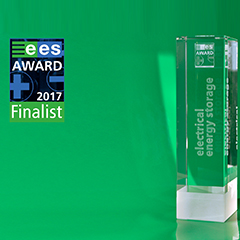Finalists announced for the energy storage industry’s innovation prize
Munich, May 8, 2017 – Grid integration of renewable energies, increased efficiency and durability of lithium-ion batteries, and the step towards megawatt output: The ees AWARD 2017 reflects the current developments in the industry. Finalists for the prestigious award have been selected from a wide range of international submissions. The winners will be announced at ees Europe, the continent’s largest and most visited exhibition for batteries and energy storage systems, at the Innovation and Application Forum on May 31, 2017. The exhibition takes place parallel to Intersolar Europe, the world’s largest exhibition for the solar industry and its partners, from May 31 to June 2 in Munich.
Over the last few years, the energy storage industry has boomed. Systems are becoming increasingly affordable – for example, lithium-ion storage systems were 15% cheaper in the second half of 2016 than the start of 2015 – making it increasingly attractive to invest in this technology. The development is being driven by numerous innovations which make batteries more powerful and more reliable. The ees AWARD has been honoring pioneering developments in the industry for four years.
Submission trends
The industry is clearly dominated by the topics of efficiency and durability, which is reflected in the submissions for the 2017 ees AWARD. The vast majority of projects submitted were in the area of lithium-ion technology, with a marked increase in high-voltage storage systems. Progress has been made in terms of energy density, capacity and lifespan. Easy-to-install modular storage systems are another hot topic. Self-configuring battery systems make design and installation easier and minimize potential sources of defect. And to boost functionality, there is a trend towards standardizing interfaces and data logs. Quality and safety also play an important role amongst this year’s submissions. The aim is to develop systems which can be used safely for longer, while minimizing operating expenses. Large-scale storage systems in the megawatt range are gaining a foothold in the market, thanks to the decreasing cost of lithium-ion batteries. These systems support the grid by providing balancing power and stabilizing frequency and voltage, and are used as an emergency power supply or mini-grids in combination with PV and wind energy installations. Lead battery systems are also being optimized, and are frequently used in off-grid applications. Here too, there is a trend towards modularity and reducing installation and operating costs. Standardized PV battery systems which are compatible with mini-grids can be scaled to any size, and thus make it possible to supply self-controlled and self-learning power in remote areas.


























